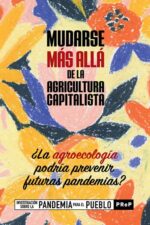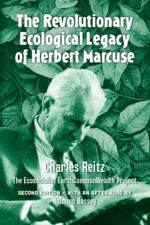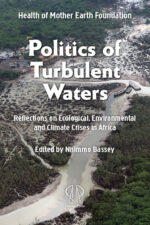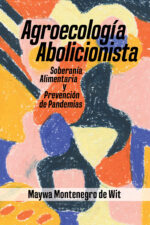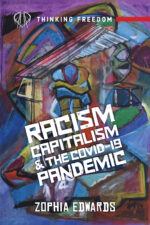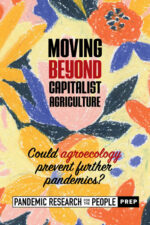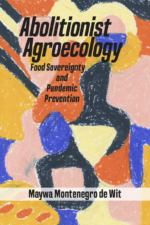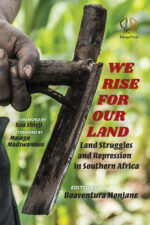-
Mudarse Màs Allá de la Agricultura Capitalista
El COVID-19 es una enfermedad neoliberal y la agroecología que libera a la tierra y a la gente de la codicia y hacia la soberanía alimentaria es el camino para salir de este desastre.
– Saulo Araujo, Amigos del Movimiento de los Sin Tierra de Estados UnidosSi quieres saber más sobre las conexiones entre el capitalismo racial, la agricultura industrial, la destrucción ambiental y las epidemias y pandemias, este es un excelente lugar para empezar.
– Arturo Castillon, coautor, El significado revolucionario dellevantamiento de George FloydEsta publicación defiende firmemente la agroecología como parte crucial de un futuro que pone a las personas por encima de las ganancias; un futuro que asegura la salud de las personas permitiendo el florecimiento de la salud planetaria. Aportará claridad a todos los que traten de entender cómo se puede evitar la próxima pandemia al tiempo que se construye un mundo más justo.
– Vijoleta Gordeljević, Economista de la salud y experta en política sanitaria medioambiental, People’s Health MovementLos agentes patógenos surgen una y otra vez de un sistema agroalimentario global arraigado en la desigualdad, la explotación laboral y el extractivismo sin límites por el que se despoja a las comunidades de sus recursos naturales y sociales. Un sistema económico propenso a la crisis que prioriza la producción para obtener beneficios por encima de la satisfacción de las necesidades humanas y la preservación ecológica se organiza en torno a una intensa producción monocultural que, por el camino, permite la aparición de las enfermedades más mortíferas.
La Investigación sobre la Pandemia para el Pueblo (PReP) se centra en cómo la agricultura podría ser reimaginada por el tipo de intervención a nivel de la comunidad que podría detener la aparición del coronavirus y otros patógenos en primer lugar. Abordamos cómo la ciencia convencional apoya los mismos sistemas políticos y económicos que ayudaron a producir la aparición del coronavirus y otros patógenos en primer lugar.
Introducimos la agroecología, un ecologismo de los campesinos, los pobres y los indígenas, que existe desde hace mucho tiempo, y que trata la agricultura como una parte de la ecología de la que la humanidad cultiva sus alimentos. La agroecología -una ciencia, un movimiento y práctica- combina la ciencia ecológica, los conocimientos indígenas y campesinos y los movimientos sociales por la soberanía alimentaria y territorial para lograr sistemas alimentarios ambientalmente justos.
-
Agroecología Abolicionista, Soberanía Alimentaria y Prevención de Pandemias
Un sistema alimentario agroecológico no consiste más acerca de alimentos orgánicos que la abolición se refiere a abrir la puerta de una prisión. En este ensayo vital, Maywa Montenegro de Wit entrelaza ideas provenientes de las literaturas políticas y ecológicas más importantes de finales del siglo XX y comienzos del XXI. La pandemia proporciona un foco para estas dos fuentes de iluminación, pero la luz brillante que proviene de unir estas disciplinas brillará mucho después de que pase la sombra de la Covid-19. —Raj Patel, autor de Stuffed and Starved [Relleno y famélico].
El folleto resuena con la pregunta: ¿reforma o transformación? Pregunta: ¿mitigaremos y adaptaremos o revisaremos y cambiaremos nuestros imaginarios? Se nos ha dado un andamio para abordar el bastión del colonialismo y la colonialidad y para reconstruir los sistemas que ya han empujado su rodilla sobre los sistemas alimentarios y socioeconómicos que ya se estaban sofocando. Es hora de librarse de una pesadilla construida deliberadamente. – Nnimmo Bassey, autor de To Cook a Continent: Destructive Extraction and the Climate Crisis in Africa [El cocinar un Continente: Extracción Destructiva y Crisis Climática en África] y fundador de Health of Mother Earth Foundation [Fundación Salud de la Madre Tierra].
La COVID-19 y otros brotes zoonóticos como el ébola son ilustrativos de las complejas interacciones entre la deforestación, la pérdida de biodiversidad, la destrucción del ecosistema y la salud y seguridad humanas. Estos cambios son impulsados principalmente por la agricultura industrial y el sistema alimentario globalizados, respaldados por el ilógico y destructivo capitalismo racial. … Montenegro de Wit presenta argumentos convincentes a favor de cambios hacia sistemas agroecológicos diversificados que reconozcan las complejas interconexiones entre la salud humana y animal, entre las plantas y nuestro medio ambiente y futuro compartidos. De hecho, abordar las pandemias de manera sistémica no puede desvincularse de la construcción de economías y sistemas alimentarios que se basan en las necesidades de las personas, en particular de los pequeños agricultores, y de los ecosistemas prósperos. Para lograrlo, debemos rechazar y prohibir rotundamente la ecocida ilógica de la mercantilización, la financialización y el extractivismo, como fuerzas impulsoras de las fortunas y los destinos humanos y ecológicos. … El fortalecimiento de los movimientos sociales a nivel local es indispensable para forzar la ruta de África hacia un liderazgo político eficaz y democrático. Se necesita una clara ruptura, dejando atrás intervenciones a favor de un desarrollo ahistórico y tecnicista, donde la tecnología y la productividad se plantean como problemas y soluciones, hacia un replanteamiento urgente y drástico para hacer frente a las crisis sistémicas convergentes que enfrentamos hoy.
– Mariam Mayet, directora ejecutiva del African Centre for Biodiversity [Centro Africano para la Biodiversidad]
COVID-19 ha expuesto la naturaleza racializada de los sistemas alimentarios, pero también potencialmente otorga oportunidades para construir de nuevo. Maywa Montenegro explora una serie de averías, desde cadenas de suministro fracturadas hasta infecciones incontroladas entre trabajadores de alimentos esenciales, entre comunidades negras, marrones e indígenas atravesadas por el virus a lo largo de viejos surcos de opresión racial y de clase.
Ella rastrea los orígenes probables de COVID-19 a los sitios de derrame forjados por la expansión agroindustrial en regiones boscosas donde los patógenos brotan libres e infectan a los humanos. La agricultura animal industrial impulsa estos cambios ecológicos que incuban futuros brotes. Las pandemias tienen sus raíces en la separación violenta de las comunidades de sus territorios, semillas, conocimiento y riqueza. El racismo permite tal robo como fundamental para la expansión capitalista.
Para hacer frente a las pandemias y las injusticias alimentarias, Montenegro pide una agroecología abolicionista. Ninguna alternativa anticapitalista puede ignorar el racismo que es central para el sistema alimentario transnacional. Académicos como Angela Davis, Ruth Wilson Gilmore y Mariame Kaba han argumentado que aunque la abolición se ve con frecuencia como una estrategia de oposición, para erradicar, por ejemplo, las prisiones y la policía, la abolición es igualmente proposicional. Una agroecología abolicionista abre múltiples posibilidades que responden a las exigencias de un planeta pandémico: no hay una “normalidad” a la que podamos regresar con seguridad.
Esta es una traducción al español de Abolitionist Agroecology, Food Sovereignty and Pandemic Prevention
-
Racism, Capitalism, and COVID-19 Pandemic
The COVID-19 pandemic has brought into sharp relief the deep structural problems affecting nonwhite racialized workers in the core and periphery. Yet, many social scientific analyses of the global political economy, at least in the pre-COVID era, are race neutral or willfully indifferent to the persistent racial pattern of global inequalities. This piece seeks to understand how the unremitting super-exploitation of Black and other nonwhite racialized labor in the core and the periphery persisted throughout the COVID-19 crisis through the lens of Black radical scholarship on racism and capitalism. It historicizes the pandemic within the long arc of racist capitalist labor super-exploitation at the birth of capitalism and in its subsequent unfolding. It also shows the mechanisms by which COVID-19 has exacerbated the already existing, structural racial and colonial inequalities that undergird the global economy. White capital and European and North American states have deemed Black and other nonwhite racialized labor “essential” to maintaining profits and called upon these workers both within North America and Europe and in the global periphery to ensure continued production and profits in almost every realm. These workers were seen as essential but expendable; compelling them to continue laboring during the deadly pandemic increased the precarity and danger they faced and exacerbated racial and economic inequalities both within and between countries. At the same time, neoliberal racist states are further marginalizing these very workers by excluding them from much needed social protections to cope with the impacts of COVID-19 on their health, income, and overall well-being. The piece also illuminates why, despite the dire social and economic conditions threatening the lives and livelihoods of workers writ large, white workers continue to refuse to join a multiracial antiracist movement for liberation from imperial and racial capitalist exploitation. The author ends by reflecting on what it means to “return to normal” within the architecture of racial capitalism and the pursuit of a different path to justice and freedom.
See also our interview with Zophia Edwards and David Austin.
-
Moving Beyond Capitalist Agriculture: Could Agroecology Prevent Further Pandemics?
Moving Beyond Capitalist Agriculture is born out of the coordination between scholars and community organizers and it should be shared widely. The group behind it, the Pandemic Research for the People, is an expression of collective wisdom and necessary unease. In fact, organization and solidarity are two values to be cherished in this moment of multiple crises. COVID-19 is a neoliberal disease and agroecology that frees the land and people of greed and towards food sovereignty is the pathway out of this mess. — Saulo Araujo, US Friends of the Landless Workers Movement
If you want to know more about the connections between racial capitalism, industrial agriculture, environmental destruction, and epidemics and pandemics, then this is a great place to start. But this pamphlet is more than just an analysis of the immense problems generated by capitalism. More importantly, this pamphlet represents an attempt to overcome this system and to develop revolutionary alternatives to it. Rather than falling into the tempting illusion of reform, the authors of these texts give invaluable insights into how we might support and develop revolutionary forms of agro-ecology that can sustain and reproduce life outside of the racial capitalist machine that is destroying it.” — Arturo Castillon, co-author, The Revolutionary Meaning of the George Floyd Uprising
Increasingly threatening climate disaster coinciding with a pandemic has tragically illustrated that the world doesn’t have the luxury of dealing with one crisis at a time – and capitalist agriculture is at the root of both. The authors show convincingly that there is a better way: one that’s based on self-determination and building on human cooperation, not competition. This publication makes a strong case for agroecology as a crucial part of a future that puts people above profit; a future that assures people`s health by allowing planetary health to flourish. It will bring clarity to everyone trying to understand how the next pandemic could be averted whilst building a more just world — Vijoleta Gordeljević, Health economist and environmental health policy expert, People’s Health Movement.
Pathogens repeatedly are emerging from a global agrifood system rooted in inequality, labor exploitation, and unfettered extractivism by which communities are robbed of their natural and social resources. A crisis-prone economic system that prioritizes production for profit over meeting human needs and ecological preservation is organized around intense monocultural production that, along the way, allows the deadliest of diseases to emerge. The Pandemic Research for the People (PReP) focuses on how agriculture might be reimagined as the kind of community-wide intervention that could stop coronaviruses and other pathogens from emerging in the first place. We address how mainstream science supports the same political and economic systems that helped produce the pandemic. Then we introduce agroecology, an environmentalism of the peasantry, the poor, and indigenous, long in practice, that treats agriculture as a part of the ecology out of which humanity grows its food. Agroecology—a science, movement, and practice—combines ecological science, indigenous and peasant knowledges, and social movements for food and territorial sovereignty to achieve environmentally just food systems.
Peasant- and indigenous-led agroecology is uniquely positioned to limit the spread of zoonotic viruses: Post-capitalist agroecology champions the indigenous and smallholders who protect agricultural biodiversity. A diverse agroecological matrix of farm plots, agroforestry, and grazing lands all embedded within a forest can conserve animal biodiversity in the landscape. Agricultural biodiversity can make it more difficult for zoonotic diseases to prevail. Such a mode of conservation also takes into account the economic and social conditions of people currently tending the land, rather than a conservation that uproots people to foster the private accumulation of capital.
Contents: Introductory note / Globalized food systems, structural inequality, and COVID-19 / What is mutual aid? A COVID-19 Primer / Can agroecology stop COVID-21, -22, and -23? / Moving Beyond Capitalist Agriculture
-
Abolitionist Agroecology, Food Sovereignty and Pandemic Prevention
COVID-19 has exposed the racialized nature of food systems, but also potentially grants opportunities to build anew. Maywa Montenegro explores a series of breakdowns, from fractured supply chains to uncontrolled infection among essential food workers, among Black, Brown, and Indigenous communities scythed through by the virus along old grooves of race and class oppression.
She traces the likely origins of COVID-19 to spillover sites forged by agroindustrial expansion into forested regions where pathogens spring free and infect humans. Industrial animal agriculture drives these ecological changes that incubate future outbreaks. Pandemics have their roots in the violent separation of communities from their territories, seeds, knowledge and wealth. Racism enables such theft as fundamental to capitalist expansion.
To tackle pandemics and food injustices, Montenegro calls for an abolitionist agroecology. No anti-capitalist alternative can ignore the racism that is central to transnational food system. Scholars including Angela Davis, Ruth Wilson Gilmore, and Mariame Kaba have argued that although abolition is frequently seen as an oppositional strategy — to eradicate, for example, prisons and police — abolition is equally propositional. An abolitionist agroecology cracks open multiple possibilities that respond to the exigencies of a pandemic planet — there is no ‘normal’ to which we can safely return.
-
PAS DE REDD EN AFRIQUE
USD $ 10.00La présente publication du Réseau Pas de REDD en Afrique (No REDD in Africa Network) a pour but de démystifier le REDD, les projets de type REDD et toutes leurs variantes, et de montrer ce qu’ils sont vraiment : des mécanismes injustes conçus pour lancer une nouvelle phase de colonisation du continent africain. Les exemples présentés démontrent clairement que le REDD est une escroquerie et que les pollueurs savent qu’il leur permet d’acheter le « droit » de polluer.

